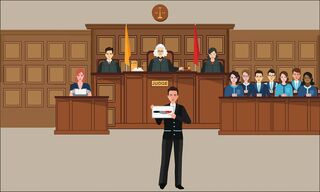Psychology
The Psychology of Jury Selection
How jurors are vetted by psychologists.
Posted March 29, 2022 Reviewed by Kaja Perina
Key points
- Jurors are vetted to be fair and impartial but many unfairly favor good looking defendants.
- Lawyers are snoops: Jury selection now includes personal investigations into jurors' online presence on social media.
- Your personal experiences, religion, politics, education, hobbies and personal life are all reviewed in jury selection.
- How you process information in your brain impacts how you may vote on a jury.

The study of forensic psychology involves the application of clinical specialties, research and experimentation in psychology to the legal arena. (1).
One of the most observable and public intersections of law and psychology is in jury selection and jury consulting. Lawyers hire private jury consulting firms to help them examine potential jurors for trials in both criminal and civil matters. Jury consultants are usually psychologists and sociologists who specialize in interviewing, examining and analyzing potential jurors to determine how a jury is likely to react to parties and their claims.
Psychological Examinations of Jurors
The psychological examination of a jury pool, a process called voir dire, is often done by the lawyers and judge in most cases. In some cases, jury consultants are hired by lawyers in high profile or complex litigation. The basic purpose of voir dire is to determine if any particular potential juror has biases which may prejudice his or her decisions as a juror. The questions for the jurors are designed to reveal if a juror would be fair and impartial. The jurors may be personally interviewed or they may be asked to complete juror questionnaires which are analyzed by psychologists (jury consultants) who assign ratings to inform the lawyers on which potential jurors are likely to be fair and which are not. The questions can examine a juror's potential racial or religious bias, personal experiences, socio-economic status, personal history and outlook and many other factors.
In both civil and criminal cases, attorneys on both sides of the docket probe prospective jurors. Will that juror be more likely to align with one side of the case? Are they bias, prejudice, emotional, religious, liberal or conservative? Even body language and television viewing habits of jurors translates into more data to be factored in the jury selection process to weed out the 'wrong' type of juror.
Digital Investigations of Jurors
According to the American Bar Association lawyers and jury consultants now have a digital treasure trove of private information about any potential juror because 74 percent of all Americans have social networking profiles and Twitter processes over half a billion tweets per day (2). Social networking sites like Facebook have become a part of jury selection in the digital age. Lawyers can learn almost anything about jurors including their taste in movies, music, politics, education, hobbies and likes and dislikes. This type of digital inquiry has not been prohibited by law as of the date of this writing. However, the in depth digital investigation of potential jurors may eventually be prohibited as an invasion of privacy. For now, all potential jurors can be subjected to digital investigations.
Jurors Favor Attractive Defendants
A study investigating the biases of juries in criminal cases concluded that the attractiveness of a defendant can play a role in jury decisions on convictions and sentence recommendations. In this study (3), the jurors who participated were divided into two categories. Those who process information through their emotional filters and personal experiences and those who process information through objective and rational-based filters. The jurors who emotionally processed information were found to give lighter sentences to physically attractive defendants and harsher sentences and convictions to unattractive defendants. The study supports the conclusion that among the research participants, juror bias against unattractive defendants resulted in harsher conviction and sentencing outcomes.
Conclusion
The psychology of jury selection is complex because it involves the investigation of a potential juror's mind and how they process information, their biases, personal experiences and histories, digital thumbprint, age, race, and many other factors. Finding a fair and impartial juror without prejudice is difficult. It involves the probing of minds and hearts. We are all entitled to be judged in a courtroom by a jury of our peers. This means it would be patently unfair to impanel a jury of all one race and gender to judge a defendant of a different race and gender. There are inherent biases presumed in such a case. Even when a jury is composed of a diverse group of men and women, the unseen psychological prejudices they may harbor, such as being bias against an unattractive defendant, are difficult to assess.
Our legal system relies on the good faith and genuine belief of jurors to be fair and impartial as well as the jury selection process to weed out bias and prejudice. In the end, lawyers on both sides of any case are entitled to examine a jury pool and weed out undesirables, this process works overall, with the help of expert psychologists who are skilled in assessment and analysis of a fair and impartial mind. The confluence of psychology and the law in the jury selection process has proven benefits to eliminate unfair bias and implement fair and impartial jury verdicts.
References
1). https://www.apa.org (2013)
2). Browning, JG. Voir dire becomes voir google; Ethical concerns of 21st century jury selection. ABA online; 2019, April 25.
3). Gunnell, JJ, Ceci, SJ. When emotionality trumps reason: A study of individual processing style and juror bias. Behav Sci Law. 2010 Nov-Dec; 28(6): 850-77


